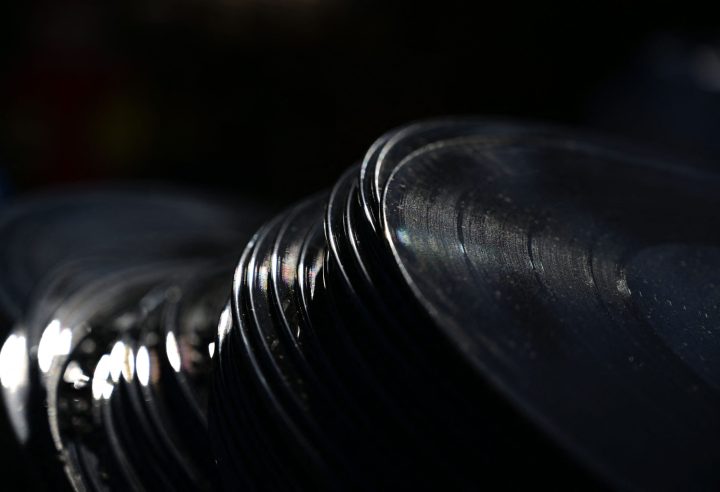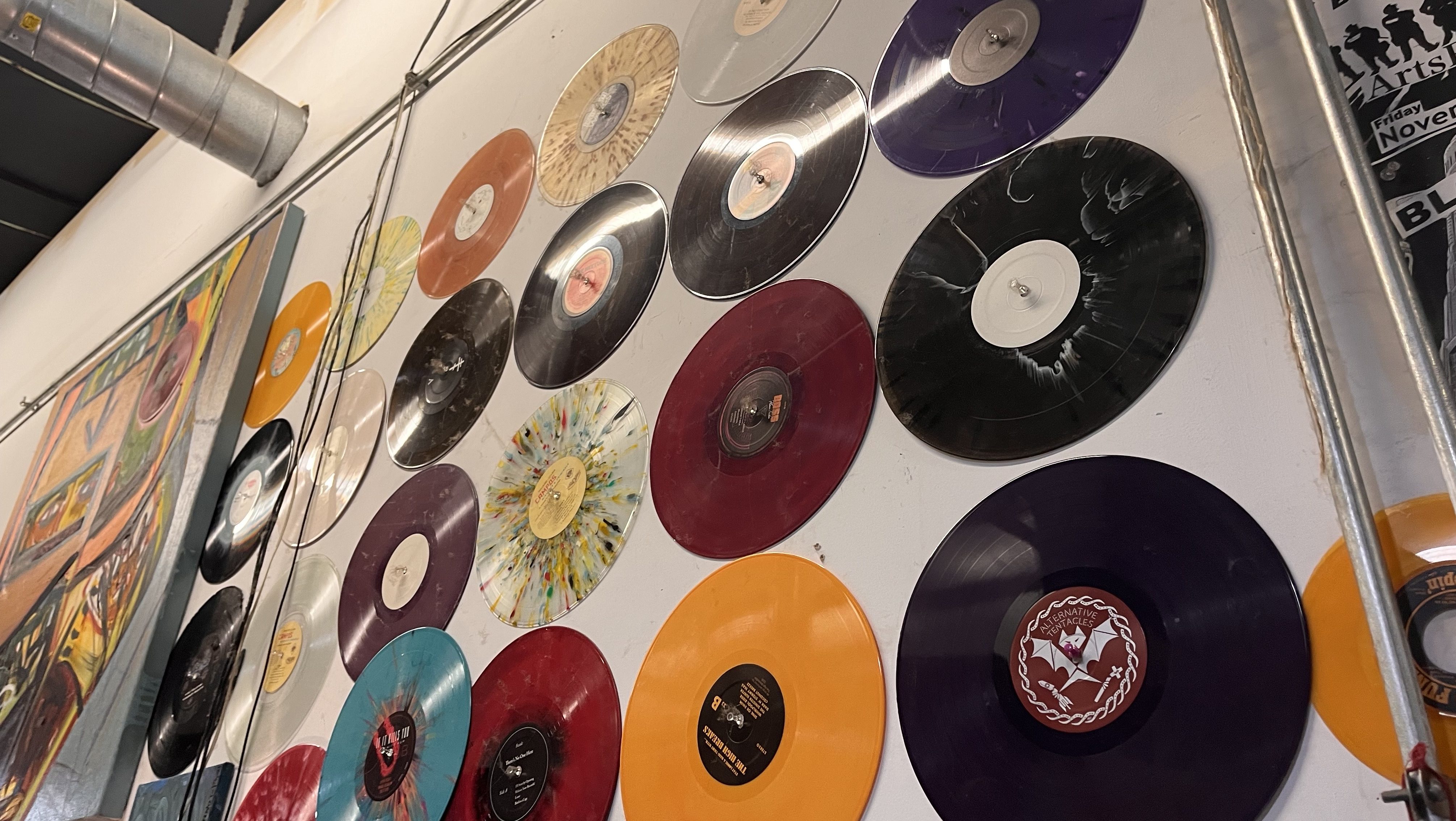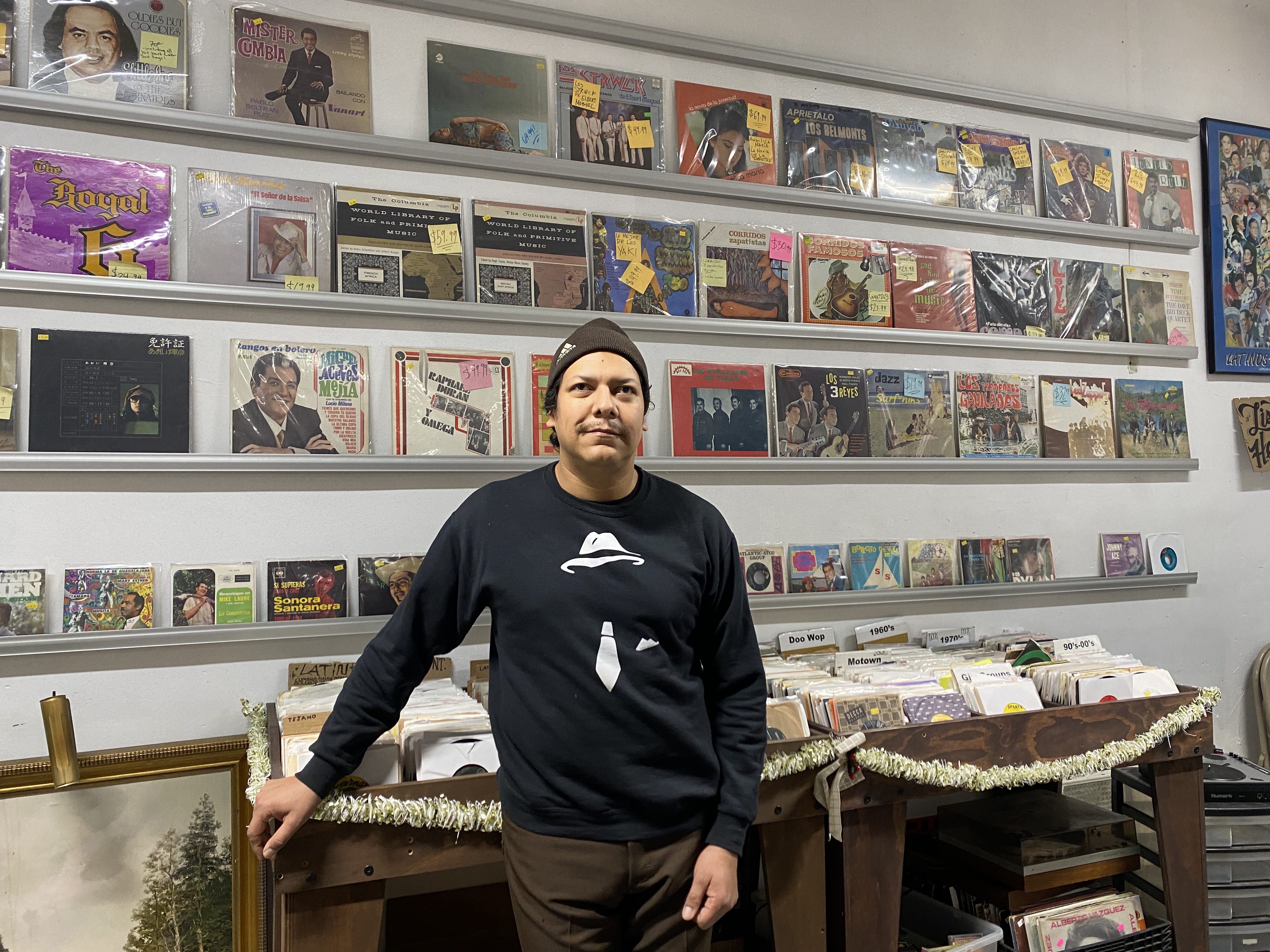
How the vinyl resurgence keeps pressing forward
How the vinyl resurgence keeps pressing forward

The vinyl revival that began in the early aughts has been as surprising as it’s endurance. And demand for vinyl keeps growing. But buyers want more records than pressing plants can produce.
In addition, as sales rise, some are beginning to look beyond supply chain shortages and bottlenecks and increasingly at vinyl’s environmental impact.
To hear how industry leaders are navigating this new era, Marketplace’s David Brancaccio spoke with Broc Barnes, a plant manager at Third Man Pressing in Detroit, Michigan. The company was founded by Jack White of The White Stripes.
Below is an edited transcript of their conversation.
David Brancaccio: You keeping up with all this demand I’m seeing?
Broc Barnes: We’re trying to, just swimming in some vinyl.
Brancaccio: I mean, we keep doing stories about supply chain issues. Any of this affecting you?
Barnes: The increase from 2019 to 2021 is just startling. And it was more of a case of demand outgrowing supply. So, the amount of orders that we saw come in over that time, when everybody was making great music, there’s just there’s so much work that we’re all trying to pass around, and it’s not that we’re not getting our stuff necessarily in time, it’s more along the lines of just trying to get to every order.
Brancaccio: Look, I know it’s cool now with vinyl. Vinyl is back. But beyond that, what’s causing the surge, do you think?
Barnes: There’s an element of like tangible use, there’s a lot of people that want to get back to being able to hold something and watch it play. The digital subscription and stuff are great, but people are buying records at concerts now instead of t-shirts. And you know, they’re able to play music that they’re really passionate about. And being able to have that come back and sound even better than what you hear over the radio or over your phone is something I think people are really getting back into.
Brancaccio: Now look, I can hear the richness of an analog recording if it’s old school, non-digital from first recording through the pressing of the disc. I mean, there’s almost what I would call a life force there that you can hear, which I feel is sometimes missing when everything is reduced to zeros and ones digitally. But Brock, clicks and pops turntable rumble, I hear that too. Sometimes I feel that we’re kidding ourselves about that it sounds good.
Barnes: Sometimes it’s in the eye of the beholder. You know, we have a whole subset of people that are audiophiles, they’re dialing into that. But here we pay very specific attention to the quality of production run, whether or not it’s a small indie artist, and they’re only doing 500 pieces with us. Or if it was, you know, Jack’s last album that had 90,000 pieces go out, we try to maintain a certain audio quality where we listen to like one in every 30 to 50 discs. So when they go out to the end user, they get the best possible experience. Some of it’s in our control, some of its not. But when it comes down to what you’re hearing, analog wise, it can’t be replicated, you know, through a stereo or through a mp3 player or streaming service. The liveness, the bass and the tone of the low ends are something that you lose when you have to convert stuff to a digital format.
Brancaccio: You mentioned Jack, I mean, that’s no less than Jack White. He’s the founder of Third Man Records and Pressing where you work. He’s actually asked other record companies to maybe consider building new pressing plants to crank out even more vinyl.
Barnes: Yes, sir. Yeah, it was a plea for if nothing else, for them to support the industry. There’s a lot of different initiatives that we’re all kind of going through at the plant level, we actually have to buy all of our polymers from overseas, whether or not it’s Thailand, or from Europe. This is where the supply chain issue really comes into play that all of our planning starts with eight weeks just to get material here from you know, most records. So with that, as a backdrop, 90% of our work is done for major labels. And for them to support us, to keep this industry, you know, bolstered is kind of where the plea was, even if they can’t start their own plants.
Brancaccio: I wanted to ask you about this. What about greener plastic? I mean, vinyl is polyvinyl chloride, PVC. And, you know, Greenpeace calls it the most environmentally damaging plastic. But here you are putting out in the world more plastic, are there alternatives being considered?
Barnes: Yeah, there’s a lot of people working on that, obviously, since we don’t manufacture it here stateside for our consumption necessarily, there’s a lot of people in Europe that are looking for copolymers that will allow them to make a better resin, maybe not even a plastic. We’re working with a company right now that has, you know, tested a bunch of different plant-based materials. But the issue is that they the things that they’re harvesting aren’t going to be ready or matured for the next 15 to 30 years. So something to fill that space is really what we’re all striving towards. That’s one of the things that we’re trying to take very seriously. Here we have a 3% or less scrap rate at the plant. Everything that we use is completely recycled. So we take all of the records that are either rejected for playback issues, or cosmetic defects, are processed, sold back to a recycling factory here, and that they put them into other manufacturing value streams that allow them to consume the same polymers that we use. So they can go into construction based plastics, things for like outdoor play sets and sheds use the same PVC that we use, and that they can introduce them into their products too. So we’re very conscious of, you know, trying to use everything we possibly can and then making sure that other people are able to put it back into their products also. It’s the same thing with our paper, and also the nickel stampers. We recycle all of the components that go into a record. We try to make the best use of the things that we have here on the planet.
Brancaccio: I gotta say one of my favorite things is a Monty Python comedy album “Matching Tie and Hankerchief.” Have you ever seen this thing?
Barnes: Oh yes I have.
Brancaccio: So you know what I’m about to tell you right? It has a pair of concentric grooves cut into it. So when you lay down the needle to play it, you could get one set of comedy skits or another kind of at random which is really clever, right?
Barnes: Yeah, Jack did that on “Lazaretto” where he had seven different Easter eggs inside of the record, which is probably one of my favorite just from a playback standpoint. There’s a hidden track inside of the, the label itself. So if you start the needle in the right place, it’ll play a song. It doesn’t sound great because it’s playing over paper. But, you know, it’s a hidden track that’s buried in there. You can start the needle in different grooves on the inside of the record, and it’ll play backwards and it has different acoustic tracks on it. And then also the lock grooves have playback sounds. So one side is just a really melodic guitar and the other side has a bunch of crows. But yeah, they do some really cool things with vinyl now.
There’s a lot happening in the world. Through it all, Marketplace is here for you.
You rely on Marketplace to break down the world’s events and tell you how it affects you in a fact-based, approachable way. We rely on your financial support to keep making that possible.
Your donation today powers the independent journalism that you rely on. For just $5/month, you can help sustain Marketplace so we can keep reporting on the things that matter to you.


















